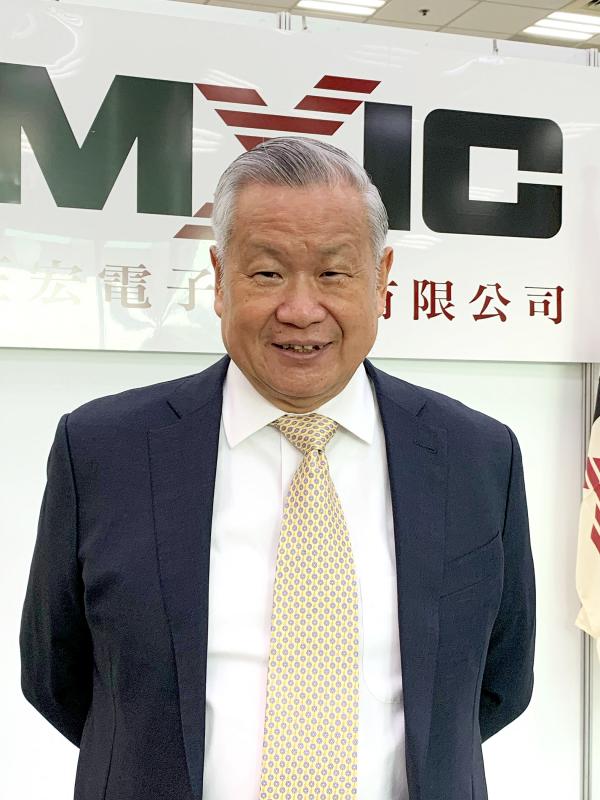Macronix International Co Ltd (旺宏), the world’s biggest supplier of NOR flash memory chips, yesterday said net profit last quarter grew 22 percent quarter-on-quarter as stay-at-home and remote learning trends boosted demand for chips used in PCs and Nintendo Co’s game consoles.
Net profit expanded to NT$1.62 billion (US$56.05 million), from NT$1.33 billion in the second quarter. That translated into earnings per share of NT$0.88, up from NT$0.72 a quarter earlier.
On an annual basis, net profit slumped 13 percent from NT$1.85 billion, or NT$1.01 a share, due to a higher tax payment, the company said.

Photo: Hung Yu-fang, Taipei Times
Gross margin last quarter climbed to 36 percent, the highest since the second quarter of 2018, on higher inventory valuation, the company’s financial statement showed.
Revenue last quarter climbed 18 percent quarter-on-quarter to NT$11.91 billion, the second-highest level in the company’s history.
Macronix gave a relatively positive outlook for the current quarter.
“Our factories are all fully utilized,” company chairman Miin Wu (吳敏求) told investors via teleconference. “Prices for NOR [flash memory chips] are quite stable. Customers are not arguing for [price cuts].”
On top of that, Wu expects NOR flash memory chip supply constraints to worsen next year given fewer suppliers, if the US-China trade dispute remains unsolved.
Macronix already benefits from the escalating dispute between the world’s two biggest economies, as it is seeing new orders trickling after US suppliers of ZTE Corp (中興) were banned from shipping products to the Chinese company without a license.
“Customers are seeking chip replacements for any contingency, though the US government does not ban the use of ZTE [equipment in the US],” Wu said. “We have been seeing new order transfers in the past few months.”
Looking ahead, the Hsinchu-based company gave a positive business outlook.
Wu said Macronix has secured contracts from Apple Inc’s OLED panel suppliers to supply NOR-flash memory chips used in the high-definition displays for the US company’s latest iPhone 12 series.
Macronix has a 50 percent allotment of the orders, he said.
However, the US government’s export restrictions on Huawei Technologies Co (華為) and a ban on using Huawei’s 5G base stations would have an adverse effect on its revenue, as Huawei is its third-largest customer, the company said.
The chipmaker is seeking new orders to fill the void left by Huawei, Wu said.
Macronix expects the automotive sector, particularly autonomous vehicles, industrial devices and medical devices to be its next growth drivers, he said.
Macronix is evaluating expanding its 12-inch wafer capacity to cope with rising customer demand for its first 3D NAND flash memory chips, but no plan has been finalized, the company said.
It plans to ship its first 3D NAND flash memory chip to its customers next month and expects the new chips to contribute to revenue next year, Wu said.
This year, the chipmaker plans to spend NT$6.5 billion on capital expenditures. It is to shut down an older-generation 6-inch fab in the first quarter next year.

TAKING STOCK: A Taiwanese cookware firm in Vietnam urged customers to assess inventory or place orders early so shipments can reach the US while tariffs are paused Taiwanese businesses in Vietnam are exploring alternatives after the White House imposed a 46 percent import duty on Vietnamese goods, following US President Donald Trump’s announcement of “reciprocal” tariffs on the US’ trading partners. Lo Shih-liang (羅世良), chairman of Brico Industry Co (裕茂工業), a Taiwanese company that manufactures cast iron cookware and stove components in Vietnam, said that more than 40 percent of his business was tied to the US market, describing the constant US policy shifts as an emotional roller coaster. “I work during the day and stay up all night watching the news. I’ve been following US news until 3am

Six years ago, LVMH’s billionaire CEO Bernard Arnault and US President Donald Trump cut the blue ribbon on a factory in rural Texas that would make designer handbags for Louis Vuitton, one of the world’s best-known luxury brands. However, since the high-profile opening, the factory has faced a host of problems limiting production, 11 former Louis Vuitton employees said. The site has consistently ranked among the worst-performing for Louis Vuitton globally, “significantly” underperforming other facilities, said three former Louis Vuitton workers and a senior industry source, who cited internal rankings shared with staff. The plant’s problems — which have not

TARIFF CONCERNS: The chipmaker cited global uncertainty from US tariffs and a weakening economic outlook, but said its Singapore expansion remains on track Vanguard International Semiconductor Corp (世界先進), a foundry service provider specializing in producing power management and display driver chips, yesterday withdrew its full-year revenue projection of moderate growth for this year, as escalating US tariff tensions raised uncertainty and concern about a potential economic recession. The Hsinchu-based chipmaker in February said revenues this year would grow mildly from last year based on improving supply chain inventory levels and market demand. At the time, it also anticipated gradual quarter revenue growth. However, the US’ sweeping tariff policy has upended the industry’s supply chains and weakened economic prospects for the world economy, it said. “Now

COLLABORATION: Given Taiwan’s key position in global supply chains, the US firm is discussing strategies with local partners and clients to deal with global uncertainties Advanced Micro Devices Inc (AMD) yesterday said it is meeting with local ecosystem partners, including Taiwan Semiconductor Manufacturing Co (TSMC, 台積電), to discuss strategies, including long-term manufacturing, to navigate uncertainties such as US tariffs, as Taiwan occupies an important position in global supply chains. AMD chief executive officer Lisa Su (蘇姿丰) told reporters that Taiwan is an important part of the chip designer’s ecosystem and she is discussing with partners and customers in Taiwan to forge strong collaborations on different areas during this critical period. AMD has just become the first artificial-intelligence (AI) server chip customer of TSMC to utilize its advanced